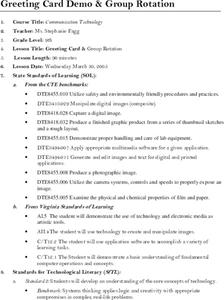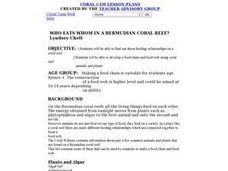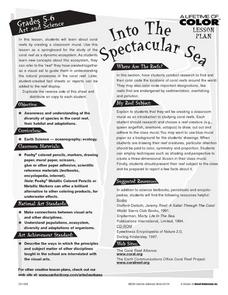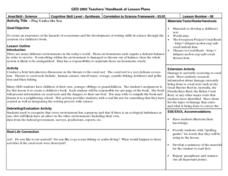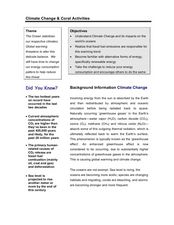Curated OER
Currents: Bad for Divers; Good for Corals
High schoolers describe, compare, and contrast major forces that drive ocean currents. They discuss the general effects of topography on current velocity. They discuss how velocity affects the ability
Curated OER
Communication Technology
Ninth graders, after several demonstrations as well as working in groups, create a four-fold greeting card with Coral Draw after examining three thumbnail sketches and a rough layout.
Curated OER
Saved by a Shark
Middle schoolers explore the marine ecosystem and the importance of sharks. In this shark lesson, students look at photos of the Flower Garden Banks National Marine Sanctuary and discuss the animals that live there. They discuss which...
Curated OER
Habitats and Adaptations
Students research and describe the habitat and adaptations of a reef animal. After the student is assigned a habitat, they design and draw a cresture adapted to eat each food and to live in each habitat.
Curated OER
Aquaculture
Students examine an experiment in which 2 types of commercial fish are fed a new type of fish feed and a commercial fish feed which costs ten times as much. They calculate in the fish grow as well with the cheaper fish feed and then...
Curated OER
Tropical Ecosystems
Fourth graders use a Palm eBook Studio text to read about tropical ecosystems. They use a study guide to orient their reading, use software to create a map of a tropical ecosystem and take a quiz.
Curated OER
Who Eats Whom in a Bermudian Coral Reef?
Students will be able to find out about feeding relationships on a coral reef. They then will be able to develop a food chain and food web using coral reef animals and plants using the Coral Website.
ARKive
Dinner at the Reef
Fine dining can happen anywhere, even in the coral reefs. Budding environmentalists explore marine food chains, predator-prey relationships and the importance of a balanced ecosystem. These important concepts are facilitated through a...
Florida International University
Counting FishStix
How do we count the fish in the ocean? An engaging lesson models how to estimate fish populations with observational surveys. Class members begin by studying the behavior of fish on the coral reef in the oceans. They...
Curated OER
Are You Related?
High schoolers study microsatellite markers and explain how they might be used to identify populations. They use data to make inferences about the populations of deep-sea corals.
Curated OER
Conservation
Fifth graders examine how destructive fishing practices affect the health of coral reefs. They watch a Powerpoint Presentation, conduct an experiment, and in small groups create a Powerpoint Presentation.
Curated OER
Who's Your Neighbor?
Students recognize and identify some of the fauna groups found in deep-sea coral reef communities. They describe common feeding strategies used by benthic animals in deep-sea coral reef communities.Students be able
Curated OER
Into the Spectacular Sea
Students research coral reefs as dynamic ecosystems and the part that each organism plays within that ecosystem. They create a mural of a coral reef.
Curated OER
Play Under the Sea
Students explore the hazards of ecosystems and utilize their writing skills to create a studenT book. Threats to the ecosystem of the coral reef are discussed and used as a model for the research of the group.
Curated OER
OCEAN PAINTINGS
Fifth graders research animal life in a coral reef. They learn and use the wax-resist technique for painting, and create a picture of an ocean animal.
Curated OER
Sea Scape
Students learn about and make models of coral reefs. In this reef ecosystem lesson, the class locates a number of coral reefs on a map. They learn how a coral reef is a balanced ecosystem that depends upon all of it's plant and animal...
Curated OER
Treasures in Jeopardy
Pupils compare and contrast deep sea coral reefs to shallow water reefs. In this coral reef lesson students develop a poster that could be used to educate the public about the importance of coral reefs.
Curated OER
A Reef of Your Own
Students research and study the life and reproductive strategies of reef building corals. They examine how coral reefs can produce high levels of biological material when they are surviving in areas of low nutrition.
Curated OER
Feeding in the Flow
Students examine current flow and describe ways in which it may effect food of reef building corals. In this coral lesson students identify two environmental factors that may affect the morphology.
Curated OER
Bank On It! Environment
In this science worksheet, students complete a cloze activity about coral reefs. They select words from a word box to fill in the 15 blanks in the article. This worksheet could also be used for reading comprehension in a language arts...
Curated OER
Coral And Kelp Game Direction- Beginning C Or K
In this initial c or k spelling game, students color and cut out 12 game cards. Each has a picture, with a c or k word with the first letter missing. Detailed instructions and a game board are included.
Curated OER
Biological Relationships - Coral Reef Memory Game and Chain Game
Middle schoolers familiarize themselves with the interconnectedness of species within an ecosystem, and to use this knowledge to evaluate how the removal or decimation of one species can have far reaching effects.
Curated OER
Climate Change & Coral Activities
Students study how the ocean stabilizes our planet's climates and how global warming is becoming a threat to this fine balance. In this climate change instructional activity, students identify that fossil fuel emissions are...
Curated OER
Under the Sea
Students identify and interpret that non-fiction books have features like a table of contents, a glossary, and an index, which can efficiently help them find information. They also identify how to narrow the search for information by...
Other popular searches
- Coral Reefs
- Coral Reef Worksheets
- Coral Reef Food Chain
- Coral Reefs Coloring Pages
- Coral Reef Biology
- Coral Reef Art
- Coral Polyps
- Coral Reef Ecosystem
- Coral Reef Lesson Plans
- Coral Reef Bleaching
- Coral Reef Habitat
- Coral Communities



